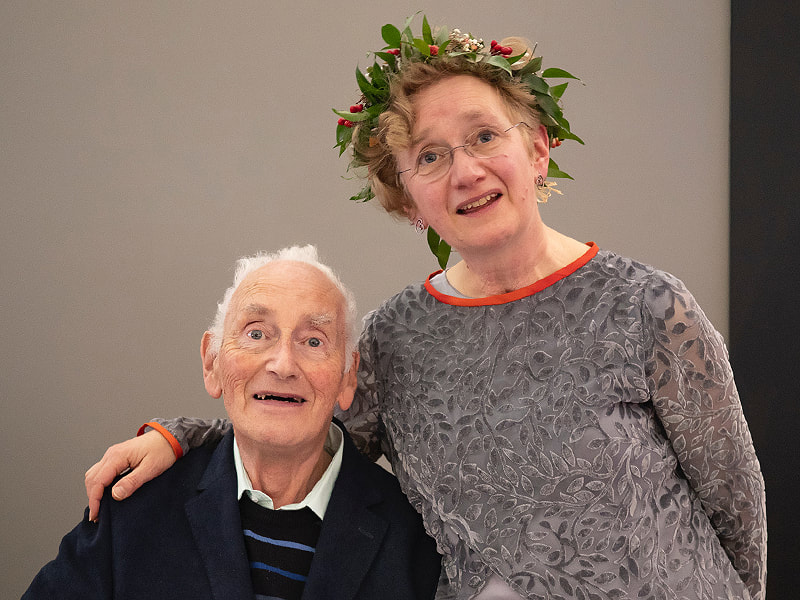I now allow the comfort provided by what my friend, J, said, on Myra's death: "A mother’s love lasts long after the final hug."
0 Comments
A year on, I'm reconciled to the choices Myra made. And I've forgiven myself for not being as forebearing as I might have.
I find myself standing at the Myra-bed having conversations with her: — You were right about that clematis – it wasn’t dead. And would you believe, the lily-of-the -valley are already full of flowers? Fragrant little bells. — Myra Bells. (Bell was her maiden name.) — I’m sorry I argued about making this flower bed, Mum. It’s lovely now. A special place to stand and chat to you. — Hmpf. (She wasn’t above an ‘I-told-you-so’.) — By the way, that camellia you rescued has more flowers on it this year than ever before. Whatever did you feed it? — TLC, love.
One afternoon I cuddled up to what was left of her and cried like a child. She tried to cradle me like a mother. - Don't cry, darling. It will be alright. - What if your pain is from cancer? - Well then I’ll die from cancer. - But you might need serious pain medication. - No more pills. Sometimes, for a few days or weeks she’d forget not to eat and drink, put on a few grams and get back to making political predictions: That Boris Johnson, he’ll be next Prime Minister, mark my words. To transgenderise Roth writing about his father:
Nisht Vor Mir Today my father summons his grandmother, an old lady. Nisht vor mir, she would say. Not for me, someone else must bend to pick up from the floor. Nisht vor mir, I am old now, I am too old. He is a small, obedient grandson, picking up the things she drops. Now he is the young man in the photo in Mum’s wallet nearly sixty years since they made their vows. (Youth’s easy promise. Old age? Nisht vor uns.) Now she counts out her pledge to him with his bedtime pills, helps him dress, keeps his youth between the notes. Nisht vor mir: Not for me (Yiddish) Pun-gent
This evening I get a call from CareLine. Mother has been pressing the emergency button (on a chord around her neck) repeatedly. CareLine phoned her number, but no response, so summoned an ambulance; they’re just letting me know as Next of Kin. An ambulance – she won’t like that, even if she’s dying. Especially if she’s dying. I rush over. Outside her housing complex I see the First Responders unit– they’re leaving. —Excuse me, have you just attended Myra Miller? —Yes. Don’t worry, duck, she’s alright. —What happened? —She couldn’t get her laundry out the machine. I start to laugh. I know I shouldn’t, but it’s the sight of these two burly blokes bristling with life-saving equipment and the thought that they rushed down the corridor … to rescue wet washing.
—Aye, bless ‘er. Offered to make us a cuppa and a Christmas cake each next year.
The difficulty of coping with an elderly, confused parent - a conversation I've found myself having quite often in recent years. With Frederica, something about a lack former intimacy between us facilitated my confession about feeling resentment towards my mother; I suspected that Myra then, about two years ago, was far more capable than she allowed herself to be. (Scans and assessments indicated some fall off in cognitive function, but not as much as she complained of). And she certainly didn’t need the two sticks she insisted on. When angry she strode off without support... like when I so annoyingly pointed out that hers was a gilded life by comparison with those of the people I’ve worked with in the Kalahari desert. Frederica raised an elegant eyebrow — And how did that go for you? I laughed and show her my ‘knife’ wounds. Frederica refers me to a TEDX talk, ‘The Power of Connection’, by clinical psychologist, Hedy Schleifer, who like me, had a hero mother * she felt she was losing to dementia. It resonated with me so I'll list some learnings:
So, before ringing Myra’s doorbell, I mentally discarded my suspicions, grudges, resentments and agenda, and stepped in just as her daughter. No baggage. You know what? It worked.
— I can’t tell if it’s day or night.
— I know; it’s that time of year. Short, dark days. — When I woke up just now I thought it was morning, but it’s not, is it? (She looks genuinely puzzled) — No, it’s late afternoon, nearly early evening. Later she returns to the worry. — I don’t know if it’s morning or afternoon. — Look at your clock. See, it says 16;43. — But is that 16:43 in the morning or the afternoon? — Um, perhaps we should reset the clock to show a.m. and p.m? — I won’t see that. Later, still fretting about date and time while staring at the large clock with its enormous numbers on the display. — It’s going to be Boxing Day soon. — Yes. — My mother died on Boxing day. Maybe I’ll be lucky. Anyone remember the way the eponymous hero in Vernon God Little likened a mother’s ability to emotionally wound her child as receiving a small stab in the back? (Whatever happened to DBC Pierre after that great literary début?) My mother’s dementia seems to have increased her accuracy at knife-throwing. Or perhaps I’ve just slowed down as a moving target? My guilt complex, nurtured, I now realise, by Myra’s parenting style, has grown unfeasibly large and encompasses everything from apartheid to climate change. I’m a sitting duck for emotional blackmail. — You’re always too busy. — You’re always in such a rush.
Reasoning with her doesn’t help. I switch to remonstrating.
— Don't you dare scold your mother! She balls her fists and waves one at me, saying she’d like to smash it into my face. I'm shocked. I know how irritating criticism from one's child is, but her reaction is uncharacteristic and disproportionate. I withdraw, popping in only briefly for errand-duty in the days that follow. She doesn’t say sorry and nor do I. While I stand at the door she bumbles around her immaculately organised flatlet trying to find the chore lists she’s drawn up for me. They are lost amid her coping notes:
— Every time you walk through that door I start feeling confused. (A knife, but just a glancing blow). — I’m sorry, we say simultaneously. My parents met in Leeds in the early 1950s. He was the George Best of his day, handsome and headstrong, unusually, a South African import in the Leeds United football squad. I wondered how a naturally shy person like Myra caught the eye of the local legend?
— On the bus. — Football stars travelled by public transport in those days! — Oh yes. They didn’t earn much more than anyone else. — But you weren’t a football fan. How did you recognise him? — He was always in the newspaper. Everyone knew the footballers. — I bet he flirted with you on the bus. (I’ve seen pictures of her then, the height of affordable glamour.) — Yes. Gave me tickets to a match. My dad was a big fan, so we went… But it was very embarrassing. — Why? — Because George stopped in front of the stand and waved at me when he ran onto the pitch. Everyone turned and looked at me ... my dad frowned but I knew he was chuffed. Now I understand her uncharacteristically bold decision to follow George to South Africa, in the days when it was unheard of for nice lasses to undertake solo adventures abroad. They were eventually married. Very unhappily. As an only, motherless child (Myra lost her mum aged 7) she adored George's big-hearted mother and his warm sisters, as they loved their ‘Limey’, even after the divorce. |
Author & CO
Archives
January 2021
Categories |










 RSS Feed
RSS Feed